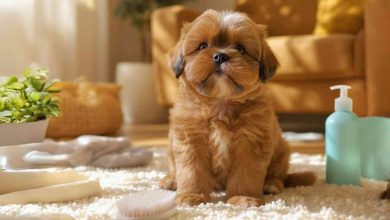Is Your Shih Tzu Puppy Sleeping Too Much? What’s Normal vs Worrying

If you’ve just welcomed a Shih Tzu puppy into your life, you’re probably noticing how often your little one sleeps. While their peaceful slumber is undeniably adorable, many new dog owners quickly begin to ask: “Is my Shih Tzu puppy sleeping too much?” Understanding what’s normal—and what could signal a problem—is essential for raising a healthy and happy companion.
Understanding the Shih Tzu Sleep Cycle
Shih Tzus are a small, gentle breed that naturally requires more rest than many others. For newborns, sleeping up to 22 hours a day is completely normal. As they grow between 3 and 12 weeks, most Shih Tzu puppies settle into 18 to 20 hours of sleep daily, and from 3 to 12 months, 16 to 20 hours per day is expected.
Sleep during this phase occurs in short naps throughout the day and night, and it serves far more than simple rest—it supports critical stages of development, growth, and emotional balance.
What Is “Shih Tzu Puppy Sleeping a Lot”?
This phrase describes the extended hours of daily sleep that are biologically appropriate for young Shih Tzus. Many new puppy owners are surprised by how frequently their pet naps, but this is a fundamental part of their early life. Unless this sleep is accompanied by unusual symptoms such as lethargy, appetite loss, or breathing difficulties, it is typically nothing to worry about.
Why Shih Tzu Puppies Sleep So Much
Growth and development are at the core of this behavior. When your puppy is asleep, their body is hard at work producing growth hormones, repairing tissue, and developing bones. Just like human babies, puppies process new sights, sounds, and routines while they rest, helping them better understand their environment as they mature.
Shih Tzus are also a brachycephalic breed, meaning they have flat faces that can slightly limit their respiratory efficiency. This makes them tire more easily, particularly after play or exposure to heat, and increases their need for frequent rest.
The Benefits of All That Sleep
Though it might seem like they’re missing out on life, puppies gain enormous benefits from extended sleep:
-
Physical growth and muscle development
-
Strengthened immune system to fight off illness
-
Improved memory and learning capabilities
-
Emotional regulation, reducing anxiety and stress
-
Recovery from activity or vaccinations
Puppies who get enough sleep tend to adapt better, train faster, and remain emotionally well-balanced.
What Healthy Sleep Looks Like in a Shih Tzu Puppy
There are clear signs that your puppy’s sleep is within the healthy range. They wake up energized, curious, and ready to eat or play. They may twitch or make gentle noises in their sleep, which are perfectly normal signs of REM sleep. You may notice a routine forming over time, with naps following meals, playtime, or potty breaks.
As long as your puppy is responsive and playful when awake, the amount of sleep they get shouldn’t be alarming.
When Sleeping Becomes a Concern
While a lot of sleep is expected, some signs can indicate a potential health issue. Be alert if your puppy:
-
It is difficult to wake or unusually unresponsive
-
Has little to no interest in food or water
-
Appears weak or shows poor coordination
-
Vomits, has diarrhea, or runs a fever
-
Exhibits labored or noisy breathing while sleeping
These symptoms could point to concerns such as hypoglycemia, parasites, infections, or even anemia. If you observe any of these alongside excessive sleep, schedule a veterinary visit without delay.
Temporary Reasons for Extra Sleep
Sometimes, increased sleep is only temporary and related to external or developmental factors:
-
After vaccinations: mild fatigue is a common immune response
-
Teething phase: discomfort may reduce playtime
-
New surroundings: stress from a new environment can lead to fatigue
-
Heavy play sessions: young puppies burn out quickly
These episodes typically pass within a day or two, especially if the puppy continues to eat, play, and potty normally.
Creating the Right Sleep Environment
Your puppy’s sleep quality can greatly improve with a comfortable and consistent environment. Here’s what you can do:
-
Designate a quiet, low-traffic sleeping space
-
Use a soft, clean bed with familiar smells
-
Stick to a routine that includes potty breaks, meals, and naps at regular intervals
-
Avoid overstimulation, especially before bedtime
-
Keep the sleeping area dim and free from loud noises
Consistency helps puppies feel secure, and that security allows them to sleep more soundly and adapt to daily routines.
Healthy Sleep vs. Sleep Concerns: A Quick Guide
Healthy signs:
-
Sleeps 18–20 hours a day (age appropriate)
-
Plays and eats actively while awake
-
Shows curiosity and affection
-
Moves, twitches, or softly snores while sleeping
Warning signs:
-
Sleeps over 22 hours with no playfulness
-
Is hard to wake and appears weak
-
Loss of appetite or sudden weight loss
-
Unusual breathing sounds or body stiffness
Monitoring your puppy’s behavior holistically—both asleep and awake—will help you catch problems early and keep them healthy long term.
When to Call Your Vet
Always trust your instincts. If you feel that something is “off” with your puppy, it’s better to have them examined. Contact your veterinarian if:
-
Sleep behavior has suddenly changed
-
Your puppy is not interacting, playing, or eating
-
There are additional symptoms like vomiting or diarrhea
-
The puppy seems disoriented or in pain
A vet visit can rule out serious concerns and provide peace of mind, especially for new pet parents.
Conclusion
“Shih Tzu puppy sleeping a lot” is not only normal—it’s essential. Rest fuels every part of their growth journey, from bone development to behavior shaping. In most cases, frequent sleep means your puppy is growing well, adjusting to life, and building a strong immune system.
But it’s your role to stay observant. Balance what’s expected with what you’re noticing, and if there’s doubt, ask your vet. A happy, well-rested Shih Tzu puppy is on the right track to becoming a confident and loving companion.
Would you like me to create an image or infographic for this blog post to match your tone and structure?
Know what’s normal—protect your Shih Tzu puppy’s health.




